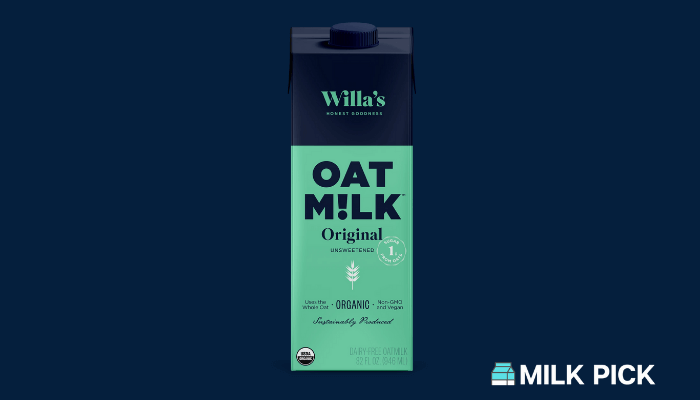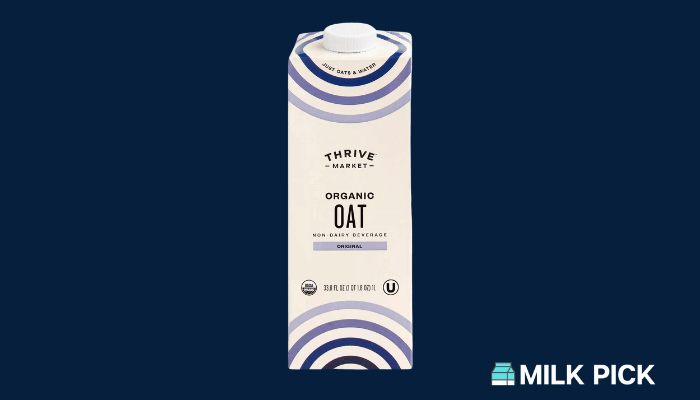Oat milk has plenty of health benefits. But as you transition your baby off of breastmilk, you may wonder whether or not it's safe for babies to drink oat milk?
According to the Centers for Disease Control and Prevention, children under one should not drink oat milk, as they do not meet a child’s daily nutritional needs.
Although babies can have oat milk after 12 months, it does not contain the nutritional benefits of breast milk.
Babies will continue to need additional nutrients to maintain proper development and growth.
Read on to learn more about giving babies oat milk!
Can Babies Drink Oat Milk?
According to the Centers for Disease Control and Prevention, children under 12 months should not be given any type of milk other than breast milk.
This includes cow's milk, oat milk, soy milk, cashew milk, almond milk, etc.
Other types of milk do not contain the nutritional requirements needed by your child to maintain proper development and growth.
Although children can start having oat milk after one, it still isn’t exactly recommended.
Many doctors recommend children old enough to stop drinking breast milk or formula should be introduced to whole milk, as it has the protein, fat, vitamin D, and calcium children need to grow.
Unfortunately, oat milk does not have adequate amounts of these nutrients.

Is Oat Milk Good For Babies?
Although children can consume oat milk after 12 months, it’s not recommended to be a staple in their diet.
Oat milk does not provide many nutritional benefits to babies and toddlers, as it does not contain enough protein, fat, calcium, or vitamin D to satisfy a child’s dietary needs.
If you want to give your one year old oat milk, doing it sparingly. And make sure they're getting their nutrients elsewhere.
Can Babies Drink Oat Milk Instead of Cow’s Milk?
Babies should not drink oat milk as a complete alternative to cow's milk, as babies have nutritional needs that oat milk simply cannot provide them.
While cow’s milk provides fat, protein, calcium, and Vitamin D, all of which are essential to the growth and development of children, oat milk lacks almost all of those.
When it comes to the nutritional differences between the two kinds of milk, it's hard for any type of milk to compete with cow's milk (at least naturally).
If your baby has a milk allergy and must avoid dairy, most pediatricians recommend meeting with them for advice.

Benefits Of Oat Milk For Babies And Toddlers
Although oat milk should not be given to babies and toddlers as a dairy substitute, you can make an argument that it’s one of the best dairy alternatives.
So what are some of the benefits of oat milk for babies and toddlers?
Easily Digestible
Oats are often recommended for toddlers, as they are easily digestible and allow them to feel full longer.
The same benefits go for oat milk!
Oat milk has a high amount of vitamins and minerals compared to many dairy substitutes and contains many necessary antioxidants such as magnesium, selenium, iron, and more.
Finally, oat milk can be high in fiber, which is essential for a healthy digestive system.
Good Source Of Calcium
Many oat milk brands are often fortified and enriched with calcium.
Although it won’t be as much as dairy milk, it’s enough to keep your baby and toddler’s bones healthy and strong.
Additionally, the amount of calcium many oat milk brands contain is enough to help your toddler’s overall nerve and muscle functions and cardiovascular health.
Strengthens Bones and Teeth
Although oat milk isn’t as nutritionally dense as dairy milk, it contains more calcium than many other milk alternatives, like almond and soy milk.
Because of this, it can boost your baby or toddler’s skeletal tissue development and help aid in the development of their teeth and nails.
Strengthens Immune System
Since oat milk is made from fibers and proteins, it helps strengthen immunity and aids in cellular development.
These are incredibly important in the early stages of development, making oat milk an excellent milk alternative to choose for your baby or toddler (after turning one).
Heart Health
Although your child needs healthy fats, the fat content in dairy milk can sometimes be incredibly high, especially when your child is likely getting it from other sources.
Consuming a large amount of fatty dairy milk on top of other fats can clog your child’s heart at an early age, which can lead to more issues down the line as they age.
Oat milk can provide a great substitute that can help keep your child’s heart healthy.

How Much Oat Milk Can Babies Drink?
Babies under 12 months old should not drink oat milk at all. Until that time, babies require breast milk or formula to get the essential nutrients for growth and development as an infant.
After they are over the age of one, you can gradually introduce babies to oat milk as you watch for any allergies they may have.
Even so, you probably still don't want to give babies or toddlers more than a serving of oat milk per day.
That said, oat milk is great for recipes and the occasional drink.
Related: Is There Milk in Nutramigen?
Best Oat Milk For Babies
Finding oat milk suitable for your baby can be tricky.
We recommend only giving your baby oat milk that contains two ingredients, organic oats and water.
Non-organic oat milk can use oats that have been sprayed with weed killer and pesticides, which you should avoid whenever possible.
Here are the best oat milk brands for children:
Homemade Oat Milk
Oat milk is one of the best milk alternatives available today, but it’s also one of the easiest to make at home with simple ingredients you probably already have.
Homemade oat milk is a great way to ensure you know exactly what is going into your body… and your baby’s.
If you’re looking for an excellent oat milk recipe, you can find one here!
Willa’s Unsweetened Original Oat Milk
This oat milk is a fantastic option for your baby or toddler, as it contains only four organic ingredients.
Not only that, but the unsweetened version has the lowest sugar content of any oat milk on the market, per the site.

Thrive Market Organic Oat
This great option has only two ingredients- water and organic oats.
It is an excellent option for those looking to introduce their young ones to oat milk!
It’s also preservative-free, low-fat, and low-sodium, so you know that your baby will be getting only the best oat milk.

How To Introduce Oat Milk Into Your Baby’s Diet
If you’re looking to introduce oat milk into your baby’s diet safely, you should first meet with your pediatrician for advice.
Each child is different, and each will have different nutritional needs.
Many pediatricians state that children over 12 months can be given oat milk in some situations, such as being allergic to dairy milk.
You should still make this decision with the help of a medical provider.
As discussed, oat milk does not have dairy milk's nutrition.
Children need a certain amount of nutrients to ensure their growth and development stay on track.
So it’s essential to make sure your child is getting nutrients elsewhere if you’re giving them oat milk instead of regular milk.
Always consult a pediatrician before changing your child’s diet, as they can point you in the right direction and provide you with great information.
Potential Side Effects Of Oat Milk For Babies
Although oat milk is a great dairy alternative, you may find that your baby can have a few side effects when introduced to oat milk.
Here are some of the side effects to watch out for:
Upset Stomach
Some babies don’t do well with consuming foods that may be richer in fiber, such as oat milk.
Because of reflux, this can lead to your baby getting an upset stomach.
It's always better to introduce oat milk to your child slowly.
Allergies
Although most people aren't allergic to oats, some are!
Make sure to look for any signs of an oat allergy when introducing your baby to oat milk.
Gluten Sensitivity
Although the oats used for oat milk are gluten-free, cross-contamination can sometimes occur in the processing stage.
If your baby has a gluten intolerance, you may find that oat milk is not for them.
Diarrhea
Since oat milk contains both insoluble and soluble fiber, it can cause bowel movements in the body.
If your baby consumes too much oat milk, you may find they will have diarrhea.
Heavy in Carbs
Since oat milk is made from whole grains, it is considered a carb-rich food and can be hard to digest.
Additionally, your baby may not need that many carbs in their diet, as they are likely getting it from other places as well.
If you are looking to add oat milk to your baby’s diet, you should consult their physician before making any big decisions, as they can likely give you a nutrition plan that will account for the amount of carbs oat milk contains.
FAQ
Can Infants Drink Oat Milk?
Infants cannot drink oat milk.
Oat milk can be introduced to babies over 12 months old, and should never be given to young children as a complete dairy substitute without consulting a pediatrician.
Infants should only be fed breast milk or formula to ensure they are getting the proper nutrition.
Can Babies Drink Oat Milk At 6 Months?
Babies cannot drink oat milk at 6 months.
Oat milk is only okay to give to babies over 12 months old in small doses, and not as a complete dairy substitute.
Can 10-Month-Old Drink Oat Milk?
A 10-month-old baby should not drink oat milk.
Oat milk is only recommended to introduce to children over 12 months old, and only in small doses and not as a complete dairy substitute.
In some cases, a 10-month-old baby can drink oat milk. It is best to consult a physician before.
Can a 9-Month-Old Drink Oat Milk?
A 9-month-old baby should not drink oat milk.
Oat milk is only recommended to introduce to children over 12 months old, and only in small doses and not as a complete dairy substitute.
In some cases, a 9-month-old baby can drink oat milk. It is best to consult a physician before.
